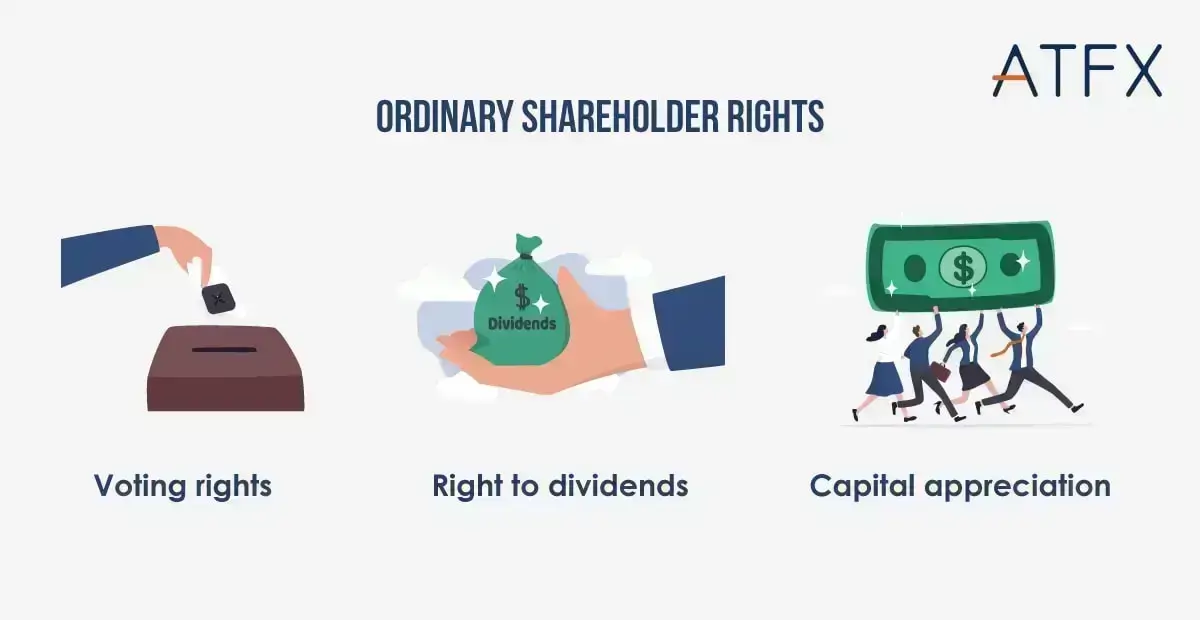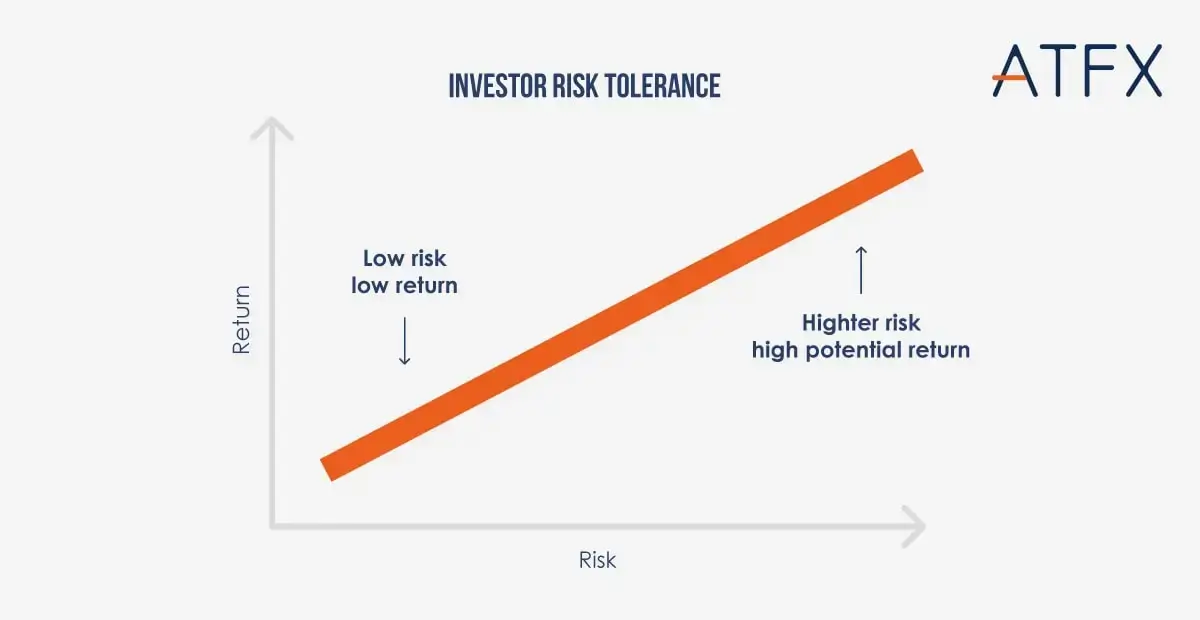Investing might seem like a big puzzle with many pieces. One of the key pieces is understanding the different types of company shares you can buy. This article will discuss in depth the 2 primary types of shares: ordinary shares and preference shares.
Table of content
- What are Ordinary Shares?
- What are Preference Shares?
- Ordinary Shares vs Preference Shares, 9 Differences You Should Know
- Advantages of Ordinary Shares
- Disadvantages of Ordinary Shares
- Advantages of Preference Shares
- Disadvantages of Preference Shares
- Ordinary Shares vs Preference Shares, Which One Should You Invest In?
- Start Trading Stocks with Us
1. What are Ordinary Shares?
Ordinary shares, also known as common shares, are the most common type of shares issued by companies, the shareholders have the right to vote in the company and may receive dividends. However, the dividends are not guaranteed and could affect by company’s profitability.
2. What are Preference Shares?
Preference shares, or preferred shares, are a type of share that gives its holders the advantage of receiving dividends before ordinary shareholders. Moreover, in the event of a company’s liquidation, preference shareholders have a higher claim on assets than ordinary shareholders. However, they typically do not have voting rights.
Learn more about “what are preference shares”.
3. Ordinary Shares vs Preference Shares, 9 Differences You Should Know
| Ordinary Shares | Preference Shares |
Risk Level | |
| High risk due to volatility, and last claim in case of insolvency | Lower risk due to fixed dividends, higher claim in case of insolvency |
Dividends | |
| Variable, not guaranteed, decided by the company | Fixed, guaranteed to be paid before ordinary shares |
Growth Potential | |
| High potential for growth as dividends and prices can increase with the company’s performance | Limited growth potential, dividends are fixed and generally do not increase over time |
Voting Rights | |
| Generally have voting rights in the company | Usually do not have voting rights |
Effect of Market Conditions | |
| More sensitive to market conditions | Less sensitive due to fixed dividends but could be called back in a low-interest rate environment |
Time Horizon | |
| Suitable for longer time horizons, given market volatility | More suited for shorter time horizons due to stable returns |
Impact of Corporate Decisions | |
| Can be significantly affected by mergers, acquisitions, and other corporate decisions | Less likely to be affected by price changes from corporate decisions, but dividends may be at risk |
Bankruptcy | |
| Ordinary shareholders are last in line to claim any remaining assets after debts and preference shareholders have been paid. | Preference shareholders have a higher claim on any remaining assets than ordinary shareholders in case of bankruptcy. However, they are still behind debt holders. |
Suitability | |
| More suitable for investors seeking growth and willing to take on more risk | More suitable for conservative investors seeking steady income and less risk |
4. Advantages of Ordinary Shares
Voting Rights
Ordinary shareholders can vote at annual general meetings, influencing key corporate decisions like electing board members.
Dividend Potential
Dividends for ordinary shareholders are not guaranteed but have the potential for higher payouts, such as the substantial dividends enjoyed by Apple Inc. ordinary shareholders in the 2010s.
Capital Appreciation
The price of ordinary shares can increase with the company’s performance, leading to capital appreciation, exemplified by Amazon’s share price growth from its IPO in 1997 to 2020.

Learn also: How to pick a stock
5. Disadvantages of Ordinary Shares
High-Risk
Ordinary shares come with high risk since ordinary shareholders are last to receive the company’s remaining assets during liquidation, as illustrated by the losses experienced by Lehman Brothers shareholders during the 2008 bankruptcy.
No Guaranteed Dividends
Dividends are not guaranteed for ordinary shares and may be cut in challenging financial times, as seen during the 2007-2008 global financial crisis when many companies reduced their dividends to preserve capital.
6. Advantages of Preference Shares
Fixed Dividends
Preference shares offer fixed dividends, providing a steady income stream for investors, as exemplified by a $5 annual payment for each share with a 5% fixed dividend rate and a $100 par value.
Priority during Insolvency
Preference shareholders have a higher claim on the company’s assets than ordinary shareholders during insolvency, offering a higher level of security.
Convertibility and Other Features
Some preference shares feature convertibility, enabling shareholders to switch their preference shares into a fixed number of ordinary shares and offering a balance between fixed dividends and potential capital appreciation.
7. Disadvantages of Preference Shares
Limited Growth
Preference shares offer fixed dividends and thus have limited growth potential, as the dividend rate does not change even if the company’s earnings increase significantly.
No Voting Rights
Preference shareholders typically do not have voting rights, limiting their influence over management decisions, which could directly impact the company’s performance and their investments.
8. Ordinary Shares vs Preference Shares, Which One Should You Invest In?
Who Typically Invests in Ordinary Shares and Why?
Investors seeking capital growth and willing to accept higher risk are more likely to invest in ordinary shares. Such investors might be younger investors in their wealth accumulation phase or any investor with a high-risk tolerance.
Who Typically Invests in Preference Shares and Why?
Preference shares are often appealing to conservative investors seeking steady income and lower risk. Such investors might be retirees looking for a stable income source or any investor with a low-risk tolerance.

Learn to invest in stock market for beginners
9. Start Trading Stocks with Us
Join ATFX in stock trading on our platform through Contracts for Difference (CFDs). CFDs allow you to predict and profit from both upward and downward market movements without the need to own the actual shares. you can test your strategies risk-free using our demo account, but you also have the option to open a live account when you’re ready.


